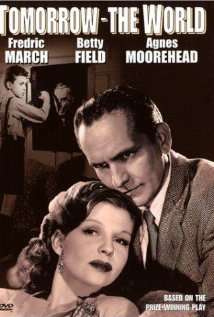Tomorrow, the World!
| Tomorrow, the World! | |
|---|---|
 Theatrical release poster | |
| Directed by | Leslie Fenton |
| Produced by |
Lester Cowan David Hall (associate producer) |
| Screenplay by |
Ring Lardner, Jr. Leopold Atlas |
| Based on |
Tomorrow, the World! (play) by James Gow and Arnaud d'Usseau |
| Starring |
Fredric March Betty Field Agnes Moorehead Skip Homeier |
| Music by | Louis Applebaum |
| Cinematography | Henry Sharp |
| Edited by | Anne Bauchens |
| Distributed by | United Artists |
Release dates | December 29, 1944 |
Running time | 86 min (82 min in the Video-Cinema Films Inc. print) |
| Country | USA |
| Language | English and German |
Tomorrow, the World! is a 1944 black-and-white motion picture starring Fredric March, Betty Field, and Agnes Moorehead, about a young German boy (Skip Homeier) who had been active in the Hitler youth who comes to live with his uncle in the United States, who tries to teach him to reject Nazism. The film, directed by Leslie Fenton, was based on the successful 1943 Broadway play of the same name.
The title comes from Hitler's infamous threat: "Today Germany; tomorrow the world."[1]
Background
The play Tomorrow, the World! opened on Broadway in New York City, New York, USA on 14 April 1943 and closed 17 June 1944 after 500 performances. The opening-night cast included Skip Homeier as Emil and Edit Angold as Frieda, both of whom originated their movie roles in the play, and Ralph Bellamy as Mike Frame, Shirley Booth as Leona Richards and Kathryn Givney as Jessie Frame.[2]
Producer Lester Cowan bought the rights to the play for $75,000 plus 25% of the gross, not to exceed $350,000. He wanted to change the title of the movie to "The Intruder," but a poll of exhibitors voted him down.[2]
Synopsis
When war breaks out in Germany, the parents of young Emil Buckner (Skip Homeier) send their son to live in the United States with his American uncle (March). Although the American family reaches out to the boy, trying to make him part of their lives, he has been heavily indoctrinated in Nazi propaganda from his years in the Hitler Youth.[3]
The uncle is a "gently liberal university professor," while the young boy – even though he is an orphan with a father who was anti-Nazi – has become "a parrot for the Third Reich, denouncing his late father as a traitor and being as nasty as possible to the professor's Jewish fiancée (Field).[4]
According to the website for Turner Classic Movies, the movie "was one of a small handful of films of the period, among them The Seventh Cross (1944), that sought to depict the everyday German. Instead of focusing on cruel Nazi stereotypes, the film concerned itself with those who were misguided or victimized by Hitler's brutal regime."[1]
Reception
Rotten Tomatoes refers to the movie as a "critically acclaimed World War II classic."[3]
The movie is one of the films highlighted in the 2004 television documentary, Imaginary Witness: Hollywood and the Holocaust, examining the way Hollywood films dealt with the sensitive topics of the Holocaust and anti-semitism.
References
- 1 2 TCM.com. Accessed January 16, 2011.
- 1 2 IMDB.com, trivia.
- 1 2 RottenTomatoes.com Accessed January 16, 2011.
- ↑ NYT review. Accessed January 16, 2011.